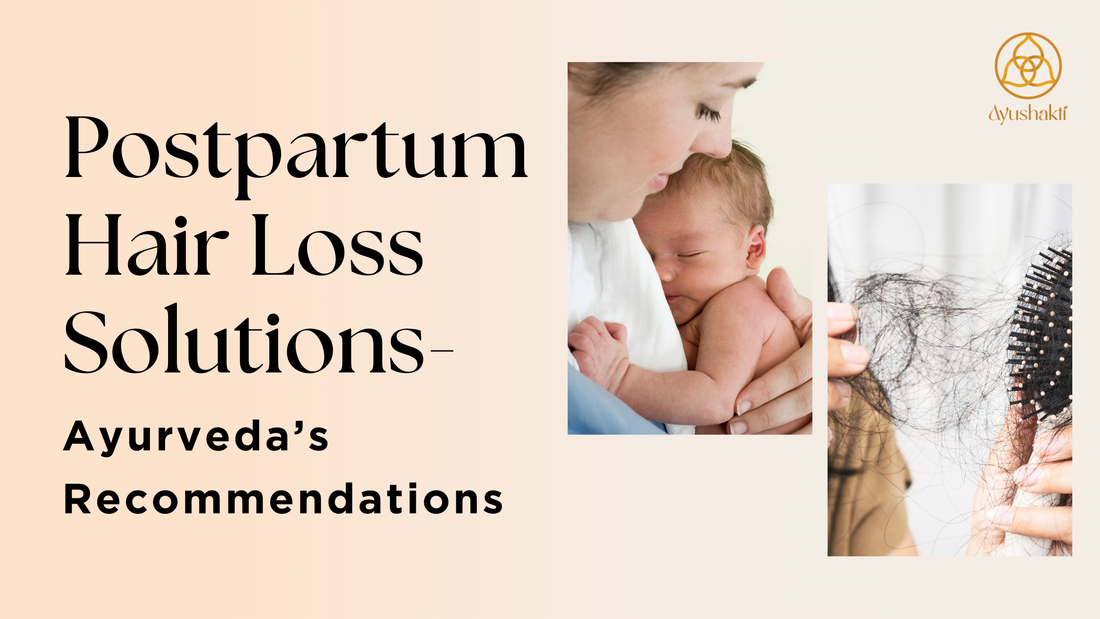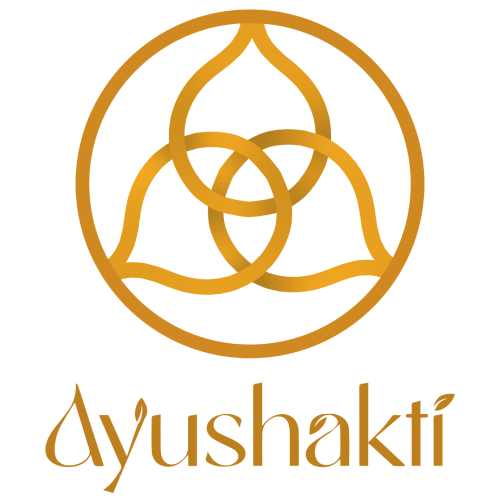
Postpartum Hair Loss Solutions – Ayurveda’s Recommendations
Share
Postpartum hair loss is the noticeable shedding of hair that many women experience a few months after childbirth. This happens due to the hormonal shifts that occur during and after pregnancy.
How Does Hair Grow?
Hair grows from follicles, tiny pores on the scalp, and follows a continuous cycle of growth and shedding. This cycle includes three main stages:
- Anagen Phase: This is the active growth stage where the hair is actively growing. It can last from two to six years, with 85-90% of your hair in this phase at any given time.
- Catagen Phase: This is a short transition phase where the hair follicles shrink.
- Telogen Phase: During this phase, the hair rests for about three months before eventually shedding.
Postpartum hair loss is a form of telogen effluvium, where hair enters the resting phase prematurely, leading to noticeable hair shedding.
How Does Postpartum Hair Loss Occur?
During pregnancy, hormonal changes cause many of the hairs that are in the active growth phase to shift to the resting phase. A few months after giving birth, as estrogen levels decrease, these hairs shed, resulting in postpartum hair loss.
Typically, a person has between 80,000 to 120,000 hairs on their scalp and loses up to 100 hairs daily. However, with postpartum hair loss, shedding can exceed this amount.
How Long Does Postpartum Hair Loss Last?
While postpartum hair loss can be alarming, it's usually temporary. Most women notice hair regrowth within six months to a year after giving birth.
How Common Is Postpartum Hair Loss?
Postpartum hair loss is very common. Most women experience some form of hair shedding after childbirth.
Signs of Postpartum Hair Loss
You might notice more hair on your pillow, in your brush, or in the shower. Stray hairs on your clothes are also a common sign of postpartum hair loss.
What Causes Postpartum Hair Loss?
Hormonal fluctuations are the primary cause of postpartum hair loss. During pregnancy, estrogen levels rise, leading to less shedding and thicker hair. After delivery, estrogen levels drop, causing a large number of hairs to shift into the resting phase, which leads to hair shedding.
Why Is Postpartum Hair Loss Considered Normal?
Postpartum hair loss is a normal response to hormonal changes after childbirth. As estrogen levels drop, hair shedding increases. The demands of caring for a newborn, along with sleep deprivation, can also add to the stress on the body. While losing hair can be distressing, it is a temporary phase, typically lasting between 6 to 8 months.
How to Manage Postpartum Hair Loss with Ayurveda
In Ayurveda, the body is believed to be made up of three doshas: Vata, Pitta, and Kapha, which influence our health, including hair health. Pitta dosha is especially linked to hair loss, and balancing this dosha can help manage postpartum hair shedding.
Here are some Ayurvedic remedies to address postpartum hair loss:
1. Scalp Massage with Chemical-Free Oils
Regular scalp massages with natural oils can boost blood circulation to the scalp and balance the doshas. Oils with ingredients like Amla, Bhringraj, Shikakai, and Aloe Vera are particularly beneficial. For a more potent effect, try adding fenugreek seeds to your oil.
How to Enhance Your Hair Oil:
- Dry roast one tablespoon of fenugreek seeds.Add the seeds to your regular hair oil
- and let it soak for a couple of hours.
- Strain the seeds and warm the oil.
- Apply it to your scalp, leave it on for an hour or overnight, and rinse out with a mild shampoo.
- Fenugreek is known for its ability to balance Vata dosha, which can help with postpartum hair loss.
2. Ayurvedic Hair Oils
Oils enriched with ingredients like Amla, Bhringraj, and Jatamansi help nourish the scalp and promote healthy hair regrowth. Regularly massaging these oils into your scalp can hydrate hair, improve quality, and reduce shedding.
3. Healthy Lifestyle Practices
Following a balanced lifestyle and maintaining a nutritious diet are essential for managing postpartum hair loss. Avoid eating leftovers or having meals while distracted. Aim for warm, freshly prepared meals at regular intervals, and try not to eat late.
4. Maintain a Balanced Diet
A nutritious diet is key. Avoid foods that can aggravate Vata and Pitta doshas, like processed foods, fried items, and dairy products. Instead, focus on fresh vegetables, fruits, and foods that nourish your hair.
5. Use Enzyme-Rich Ingredients
Aloe Vera, rich in enzymes and vitamins, can be very helpful in managing hair loss. You can use aloe vera to make a homemade hair mask to soothe the scalp and encourage hair growth. Be sure to patch-test before applying it directly to your scalp.
Ayurvedic Treatment for Postpartum Hair Loss
Ayushakti's Hair Shakti Program has helped many individuals stop excessive hair loss and promote new hair growth. The program focuses on rejuvenating hair roots, restoring scalp health, and balancing the doshas.
Benefits of Hair Shakti Program:
- Reduces hair fall quickly.
- Stimulates new hair growth from the roots.
- Improves hair quality, thickness, and volume.
- Prevents dandruff and scalp infections.
- Helps rejuvenate hair roots and prevent future hair loss.
If you're struggling with hair loss, consider getting your hemoglobin levels checked and consult with an Ayurvedic expert for a personalized plan to promote natural hair growth.
Experience Your Hair Transformation Journey with Ayushakti Ayurved!
For powerful health transformation stories, subscribe to the Ayushakti YouTube channel: https://www.youtube.com/user/AyushaktiTV
For regular health tips & updates visit Ayushakti’s Social Media Pages:
- Facebook – Ayushakti Ayurved | Facebook
- Instagram – Ayushakti Ayurved (@ayushakti)
- Pinterest – ayushaktiayurveda
Get all the updates about Ayushakti Ayurved on WhatsApp directly. Click here to Join our WhatsApp Channel
Ayushakti's mission is to help people in every way possible. Our Ayurvedic experts are available to give you a consultation either over the phone or through a video consultation. We recommend customised diets, home remedies, and detox therapies to help you recover from health problems. Book your consultation here: https://bit.ly/48JjkIF
If you would like to know the location or visit one of our centres, please click here: https://www.ayushakti.com/home/p/contact
For more information, write to us at info@ayushakti.com or call our toll-free numbers: 18002663001 (India) and +18002800906 (Global).
Blog Author: Dr. Ramchandra Konduskar
Expert Review: Dr Smita Pankaj Naram
Co-Founder, Ayushakti Ayurved Pvt Ltd
Disclaimer: This blog is for educational purposes only. Please consult an Ayurvedic practitioner before trying or consuming any medicines, home remedies or treatments mentioned in this blog. The information provided is not intended to diagnose, treat, cure, or prevent any disease.





